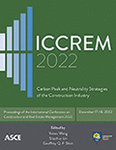Migrant Workers in Cities into Target Implementation Schedule Impact on Housing Consumption
Publication: ICCREM 2022
ABSTRACT
The article uses the 2010 Chinese general social survey data, using multiple linear regression models, from the perspective of migrant workers subject in urban housing consumption capacity and influencing factors. The migrant workers in achieving the target of progress by the consumer target localization and the expected aim of the constitution. Study found that the consumption of migrant workers targeted at deposit in the city’s housing consumption exist significant negative effects, while the consumption aims to enjoy the type of its presence in the city housing consumption significantly positive effect; migrant workers expected goal fully realized and the basic realization of has a positive impact on the city of housing consumption, and the expected target part failure and completely lost no significant effect on the housing consumption, but the expected goal of completely in vain to migrant workers housing consumption will bring about negative effects. At the same time, consumption targets and goals to achieve degree of generational differences influence on rural migrant workers in urban housing consumption ability.
Get full access to this article
View all available purchase options and get full access to this chapter.
REFERENCES
Browning, M., and Lusardi, A. (1996). “Household saving: Micro theories and micro facts.” Journal of Economic literature, 34(4), 1797–1855.
Dong, X. (2013). “History and current situation of housing problems of migrant workers in China.” Research on Financial and Economic Issues, 1, 117–123. (in Chinese).
Eckstein, Z., and Weiss, Y. (2004). “On the wage growth of immigrants: Israel, 1990-2000.” Journal of the European Economic Association, 2(4), 665–695.
Falcetti, E., Lysenko, T., and Sanfey, P. (2006). “Reforms and growth in transition: Re-examining the evidence.” Journal of Comparative Economics, 34(3), 421–445.
Gyourko, J., Kahn, M., and Tracy, J. (1999). “Quality of life and environmental comparisons.” Handbook of regional and urban economics, 3, 1413–1454.
Huang, J. Z., and Wu, L. (2004). “Specification analysis of option pricing models based on time-changed Lévy processes.” The Journal of Finance, 59(3), 1405–1439.
Jin, S. L. (2010). “On General thinking and policy framework for solving the housing problem of migrant workers.” China Opening Journal, 3, 40–44. (in Chinese).
Liu, Y. T., and He, S. J. (2008). “Research progress on rural migrants’ housing situation in China’s large cities.” Urban Planning International, 4, 19–23. (in Chinese).
Liu, X. (2005). “The Multi-dimensional dynamic basis of social stratification in contemporary China: A power generation explanation.” Social Sciences in China, 4, 101–108. (in Chinese).
Locke, E. A. (1968). “Toward a theory of task motivation and incentives.” Organizational Behavior and Human Performance, 3(2), 157–189.
Lv, P., and Zhou, T. (2008). “Identify and Countermeasures on housing security of rural migrant worker based on cost benefit analysis.” Urban Development Studies, 3, 110–114. (in Chinese).
Mansur, E. T., Quigley, J. M., Raphael, S., and Smolensky, E. (2002). “Examining policies to reduce homelessness using a general equilibrium model of the housing market.” Journal of Urban Economics, 52(2), 316–340.
Mohtadi, H. (1990). “Rural inequality and rural-push versus urban-pull migration: The case of Iran, 1956-1976.” World Development, 18(6), 837–844.
Ruoppila, S. (2006). Residential Differentiation, Housing Policy and Urban Planning in the Transformation from State Socialism to a Market Economy: The Case of Tallinn. Helsinki University of Technology, Helsinki, Finland, 5–61.
Tian, L. I. (2008). “The chengzhongcun land market in China: Boon or bane? A perspective on property rights.” International Journal of Urban and Regional Research, 32(2), 282–304.
Turner, A. N. (1968). “Organizations and human behavior: A book of readings.” Industrial and Labor Relations Review, 22(1), 140.
Wang, X. L. (2010). “Urbanization Path and City Scale in China: An economic Analysis.” Economic Research Journal, 45(10), 20–32. (in Chinese).
William, H., and Zhang, J. (1999). “Initial conditions, reform speed and economic growth of transition countries.” Economic Research Journal, 10, 69–74. (in Chinese).
Zhang, H. Q., and Wu, E. (2004). “Human resources issues facing the hotel and travel industry in China.” International Journal of Contemporary Hospitality Management, 16(7), 424–428.
Zhang, Z. (2010). “Analysis on housing choice behavior and its impacting factors of migrant workers in Beijing.” Construction Economy, 2, 5–8. (in Chinese).
Zhou, T., and Lv, P. (2011). “Migrant workers housing: Consumption characteristics and supply tactics.” Construction Economy, 3, 85–88. (in Chinese).
Information & Authors
Information
Published In
History
Published online: Dec 15, 2022
Authors
Metrics & Citations
Metrics
Citations
Download citation
If you have the appropriate software installed, you can download article citation data to the citation manager of your choice. Simply select your manager software from the list below and click Download.
